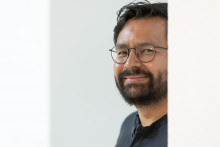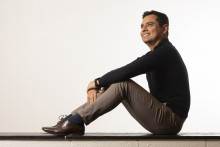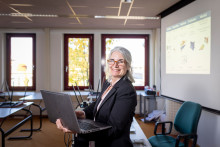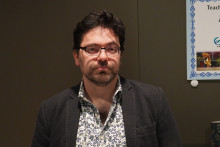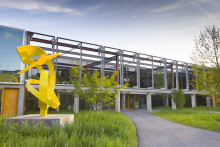‘Simply put, I try to make cities better for people. In general, I focus on marginalized communities in poor urban areas. In nearly all cities in the world, the beautiful public spaces are in the touristic areas, in the centre. Those are the areas decision makers focus on, while low-income neighbourhoods are often ignored. But all people have the right to live in a nice place.
Sergio Alvarado Vazquez
PhD research topic: Infrastructuring public spaces in Mexico through social participation using technology as a support system
Works at: Department of Urban and Regional Planning and Geo-Information Management, the Faculty of Geo-Information Science and Earth Observation (ITC)
Studied: Urban Planning and Design, University of Puebla and Guadalajara
Originally from: Mexico
My interest in urban planning probably comes from my childhood. I grew up in Mexico City and my parents used to take me to parks every weekend, to enjoy the green open space. In Mexico, public areas are part of the culture – the streets are a beautiful mess full of noise, vendors selling food and drinks, people dancing. I guess I wanted to stay in the streets, but in a more professional setting.
I worked as a city planning consultant in Mexico City. After my Master’s, I started focusing more on social participation and how it could improve wellbeing of people in cities. I also had a job in Canada, where I mainly worked with indigenous communities, making sure that their perspectives were taken into account in relation to transport planning. In 2018, I got an invitation to come to the Netherlands. I was very curious, because the Netherlands is famous for green and beautiful cities, so I wanted to see how the Dutch approach city planning.’

‘My PhD research is funded by a scholarship from the Mexican government, and it is therefore related to social issues in Mexico. In a nutshell, I try to improve cities’ infrastructure by increasing social participation and using technology. I aim to use digital tools to improve communication between citizens and decision makers. For example, I’ve used an interactive touch table displaying a map of a specific area, where people can indicate what type of changes they’d like to see. There is often a big gap between the society and the government. Decision makers design a project and implement it, but without any consultation with the citizens. I want to give people the opportunity to co-design the cities they live in.
‘I want to give people the opportunity to co-design the cities they live in’
The University of Twente is all about entrepreneurship, so I decided to also give that a go and I participated in the UT Challenge. With a colleague, we developed a mapping tool named AMACHAN that could be used anywhere in the world. It’s a survey tool based on a map, which can help get insights into various issues, for example safe areas. As a pilot project, we used it in Enschede to try to improve the public space around the train station. Unfortunately we didn’t make it to the finals of the UT Challenge, but we got an invite from Novel-T and will keep working on the project.’

‘I decided to do a PhD because it was a nice opportunity to scientifically express what I was doing in practice. I must say, it has been extremely challenging. My background is in Spanish and I suddenly had to switch to English in a country where everyone speaks Dutch. It was difficult to adjust to how things are done in Europe. Here everything is very structured, direct, punctual. In Mexico things are more relaxed and informal, even in academia. Both have pros and cons, and so it was good to get this experience. On top of that, ITC is very international. I was able to make good friends from many different countries. This opened my eyes a lot more.
‘If you keep it too chilled for too long, then you have a problem’
I like the freedom of doing a PhD. You’re your own boss and in charge of your own schedule. That is of course a challenge at the same time. If you keep it too chilled for too long, then you have a problem. In the Netherlands, people are more self-reliant. In Mexico, we are used to asking a teacher or a supervisor for direction. I was used to someone telling me what to do. Suddenly it was all up to me. That is where I crashed in the beginning. As a PhD, you have to do everything by yourself and become a self-sufficient researcher. I had to learn that the hard way.
I’m in the fourth, final year of my doctoral research and I’d like to continue as a Postdoc. Due to the pandemic, I had to reorganize my PhD and couldn’t do certain things. I planned to go back to Mexico and test using virtual reality for urban planning. This wasn’t possible, and so it would be nice to stay in academia for now. I enjoy talking to people and finding out what they’d like to have in their cities. It’s nice that I can work as a mediator between the citizens and decision makers and help to improve policies. That’s what I really like about being in academia.’



